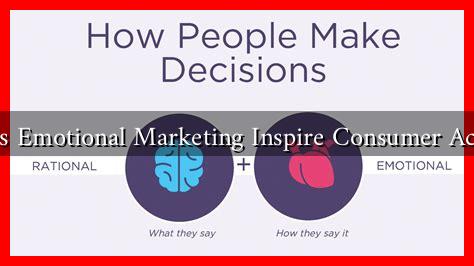-
Table of Contents
Does Emotional Marketing Inspire Consumer Action?
In the ever-evolving landscape of marketing, emotional marketing has emerged as a powerful tool that brands leverage to connect with consumers on a deeper level. By tapping into emotions, companies can inspire action, foster loyalty, and ultimately drive sales. But how effective is emotional marketing in inspiring consumer action? This article delves into the mechanics of emotional marketing, its impact on consumer behavior, and real-world examples that illustrate its effectiveness.
The Psychology Behind Emotional Marketing
Emotional marketing is rooted in the understanding that consumers often make decisions based on feelings rather than logic. According to a study by the American Marketing Association, emotional responses to advertisements can significantly influence consumer behavior. Here are some key psychological principles that underpin emotional marketing:
- Emotional Resonance: Ads that evoke strong emotions—such as happiness, sadness, or nostalgia—tend to be more memorable and impactful.
- Social Proof: Consumers are influenced by the emotions of others. Seeing others react positively to a brand can inspire similar feelings.
- Storytelling: Narratives that evoke emotions can create a connection between the consumer and the brand, making the message more relatable.
Impact of Emotional Marketing on Consumer Behavior
Emotional marketing can significantly influence consumer behavior in various ways:
- Increased Engagement: Brands that use emotional marketing often see higher engagement rates. For instance, a study by HubSpot found that emotionally charged content is shared 2.5 times more than content that is purely informational.
- Brand Loyalty: Emotional connections foster loyalty. According to a report by Accenture, 66% of consumers are more likely to switch brands if they feel a brand does not understand their emotional needs.
- Higher Conversion Rates: Emotional marketing can lead to increased sales. A study by NerdWallet found that ads that evoke emotions can increase conversion rates by up to 23%.
Case Studies: Successful Emotional Marketing Campaigns
Several brands have successfully harnessed the power of emotional marketing to inspire consumer action. Here are a few notable examples:
- Always – #LikeAGirl: This campaign challenged gender stereotypes and empowered young girls. By evoking feelings of empowerment and self-worth, Always not only increased brand awareness but also fostered a strong emotional connection with its audience.
- Coca-Cola – Share a Coke: By personalizing their product with names, Coca-Cola tapped into feelings of connection and nostalgia. This campaign led to a significant increase in sales and consumer engagement.
- Google – Year in Search: Each year, Google releases a video summarizing the year’s most searched topics. These videos evoke a range of emotions, from joy to sadness, and resonate deeply with viewers, reinforcing Google’s brand as a part of their lives.
Statistics Supporting Emotional Marketing
Numerous studies highlight the effectiveness of emotional marketing:
- According to a study by McKinsey, emotionally connected customers are more than twice as valuable as highly satisfied customers.
- A report from Forbes indicates that emotional ads outperform rational ones by a factor of 3 to 1.
- Research from Vidyard shows that 70% of consumers prefer to watch a video that tells a story over a traditional advertisement.
Conclusion: The Power of Emotional Marketing
Emotional marketing is not just a trend; it is a fundamental shift in how brands communicate with consumers. By understanding and leveraging the emotional triggers that drive consumer behavior, brands can inspire action, foster loyalty, and ultimately achieve greater success. As demonstrated through various case studies and supported by compelling statistics, emotional marketing has proven to be an effective strategy for brands looking to connect with their audience on a deeper level. In a world where consumers are bombarded with choices, emotional marketing offers a pathway to stand out and resonate with the hearts and minds of consumers.


